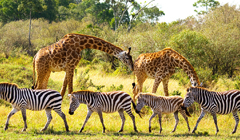Saving Wildlife
29 Video
duration: 0 Hour and 36 Minute
The decline in hippo numbers has a negative impact on the environment in Kenya
00:01:38
Video prices: 5 SAR weekly
Paula Kahumobo of the American-Kenyan organization Wildlife Direct, which fights for animal rights, says that reserves in Kenya are not enough to guarantee habitats for hippopotamuses. Animals face many problems, including desertification, urbanization, and pollution, and researchers warn that the danger to them will reflect negatively on the environment in Kenya in general, as their presence along about 400 kilometers on both banks of the Mara River constitutes, in itself, an essential pillar of environmental life there. The International Union for Conservation of Nature has placed hippopotamuses on its annual red list, which it considers to be “endangered.” Kahumobo adds that the problem in Kenya "is related to the food of hippopotamuses, which have no longer found suitable pastures in recent years due to the spread of livestock in their residential areas, and the scarcity of water and its pollution resulting from the throwing of agricultural pesticides into it." She points out that "the grass is eaten by farm livestock, while hippopotamuses die of starvation," noting that "Kenya has previously lost entire populations of hippopotamuses in other regions due to the same thing." Kahumbo says that hippos "don't graze during the day because of their sensitivity to the sun's rays, so the herds go out at night and return to the water during the day," adding that "they will have nowhere to go if pollution and desertification continue to progress like this." The Mara River plays an essential role in environmental life in Kenya, and researchers from the Belgian University of Antwerp say that "the absence of this particular animal from the region will lead to a major disruption in the ecosystem." According to scientists, one hippopotamus eats about 25 kilograms of grass rich in silicon dioxide. It grazes it at night and then releases it into the river during the day. These gases contribute to building an ecological balance, especially in terms of generating oxygen in the water. Commenting on this matter, Kahumobo says: “The decrease in silica (silicon dioxide) in the water has caused an imbalance in the natural river system, and so we see fish dying in Lake Naivasha.” The researcher points out that people in Kenya do not like hippopotamuses in general because of several cases in which the animals killed citizens, something that the press talked about a lot. Other environmental topics on Euronews: Scientists warn of the extinction of a million species of living organisms within decades. Find out the reason Watch: Environmentalists in confrontation with the government to preserve the environment A European law on eliminating the use of plastic bags



